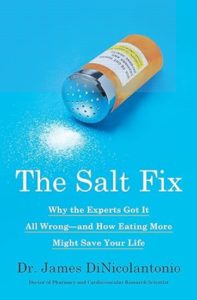Salt up, sweetie!
By far the most common complaints I hear from someone when they begin carnivore or keto are these:
- cramping
- dizziness
- tiredness
- flu-like muscle aches
- heart pounding or flutters
These are all symptoms of electrolyte loss, which is thankfully very easy to fix!
When you switch to a low-carb or zero-carb way of eating, you no longer retain fluid the way you do when you’re a sweet-eater. The first thing you notice when you finally get into ketosis is that you pee. A LOT. In fact, that first heady weight-loss success of 10-15 pounds in two weeks is mostly just water! I’m sorry to break it to you, but the fat loss doesn’t come immediately. It’s water loss that has you all excited. And rightly so! You shouldn’t have been holding on to all that water. It’s making you puffy and not benefitting you at all, locked away like that.
Carbohydrates cause your body to lock water away in your cells, and with it, salts and minerals. As you begin to burn more fat than sugar, the retained water flushes out of your system, taking with it (mainly) your sodium, magnesium, and potassium. Your body has been used to doing one thing, and now it has to learn to do another. This comes with symptoms, unless you do something about it. Attention should be paid in the first several weeks of your new way of eating to getting enough salt (mainly), and very likely a magnesium and potassium supplement as well.
But salt is bad for you!
Well…no. Cutting back on salt is one of the worst ideas modern medicine has pushed. While there are apparently a small number of people for whom a very large amount of salt really does cause high blood pressure, most people need more salt, not less. Even those salt-sensitive people will probably be able to use normal amounts of salt when they cut out the sugar. It is that other white crystal we love to consume that is causing the outrageous epidemic of high blood pressure: sugar. Cut your sugar, and your “high” salt intake will be perfectly benign. Beneficial, even! James DiNicolantonio’s book, The Salt Fix, is a very good primer on the subject:

How much salt, though? Well, all I can say for sure is: be liberal about it. Salt your food to taste. Put a pinch of salt in your water when you drink. Drink clean electrolyte drinks like LMNT or Myoxcience’s Stix. If you have symptoms, have even more salt. If you have too much salt, you will simply feel thirsty and drink more water.
I like to buy electrolyte powders for hot days, or when I’m doing a lot of hard physical activity, but most of the time, they’re a treat, rather than a necessity. They can get a little bit expensive. You don’t have to spend that kind of money. Just put some salt, and maybe some no-salt into your water. Add a daily magnesium for a few weeks, as well, at least until the symptoms are long gone. After you’re “fat adapted”, you may never need to take further measures, and you’ll just instinctively eat the amount of salt you need. Some people find after a while that they need to eat no salt at all, while others, like me, are still salt-fiends. For now, though, assume you need more salt.
Can I have too much salt? There’s very little risk of overdose, unless you’re being ridiculous. You’re not going to be ridiculous are you? Remember the woman who drank too much water too fast and died? You can overdose on anything. But if you’re being sensible and not eating a tablespoon of salt at a time, ten times a day, you are not going to hurt yourself.
Just be a little bit, maybe a lot, more deliberately salty, and you’ll be fine. Don’t let “keto flu”, which is temporary, if unpleasant, stop you from getting healthy! Salt up!
